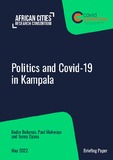Politics and Covid-19 in Kampala
Abstract
As the Covid-19 pandemic spread across the globe in early 2020, the response in the
Ugandan capital of Kampala was driven by Kampala City’s Covid-19 Task Force. This
is the mirror image of the NTF – the official government of Uganda national-level
structure that is explained in the next section. Cognisant that Uganda operates a
decentralised system, government mandated sub-national governments to customise
the response through the Covid-19 district and city task forces to coordinate and guide
the response to the pandemic in the respective administrative units (Kirenga et al.
2020). Similar to the national structure, these sub-national task forces composed of
political and technical experts that were drawn from within the respective districts
(Kadowa 2020). The political arm of the Kampala City Task Force was headed by the
minister for Kampala and Metropolitan Affairs, with members consisting of the resident
city commissioners, lord mayor and division mayors, executive director and directors,
town clerks and district medical officers, and Kampala Metropolitan Police. On its part,
the technical side was headed by KCCA’s director of public health and environment, Dr
Daniel Okello. The city’s health directorate’s emergency response team had previously
handled emergencies including spates of cholera outbreak in different areas of the city,
the Ebola epidemic, and had offered emergence support to victims of the 2010 terrorist
bombings in Kampala (Twinokwesiga 2020). At the community level, the technical arm
was supported by NGOs, the private sector and community volunteers in the form of
VHTs. The latter are a cornerstone of Uganda’s epidemic surveillance and considered
a key component in tackling infectious diseases, as they are the first health point of
contact in the community. The local council chairpersons (LC I) were responsible for
managing residents and ensuring compliance with national regulations (Federica et al.
2020). In this section, we will discuss the different forms of Covid-19 response in
Kampala, before touching on some of the organisational aspects of the response.

